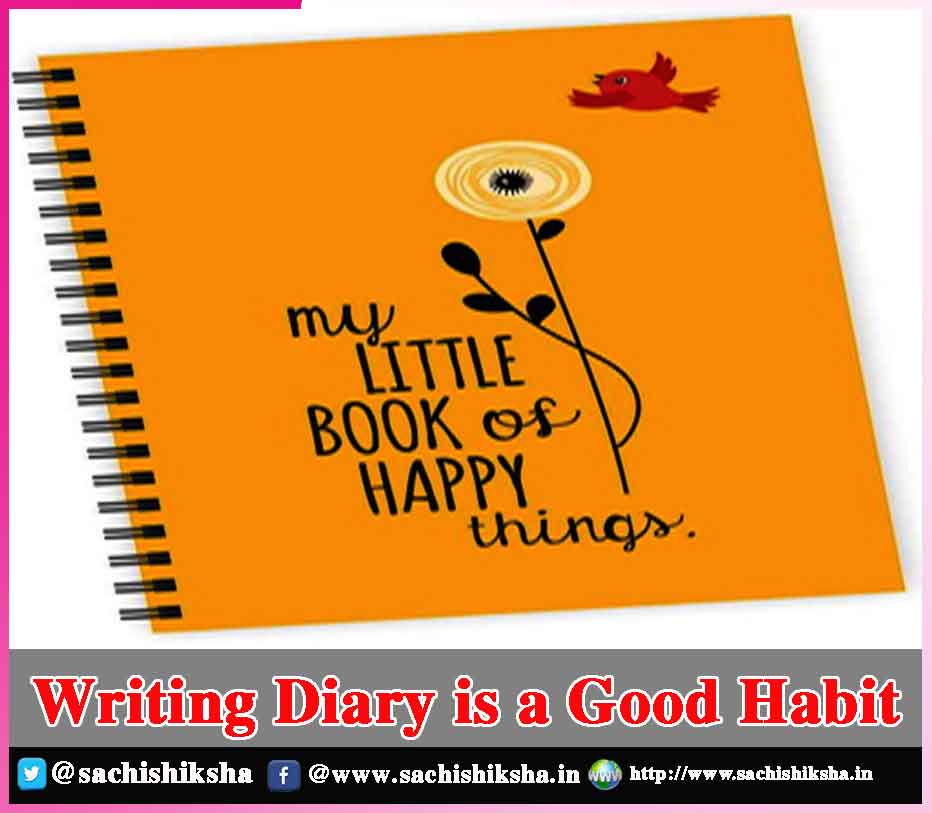Writing Diary is a Good Habit
Writing a diary can seem like a cliché or teenage habit. But it is actually proven to be proactive in improving the overall mental health and well-being of those that practice it on a regular basis. A diary is a handwritten record with separate entries arranged by date that reports on events that occurred during a given day or period.
A person’s experience, ideas, and feelings are recorded in a personal diary. A person who keeps a diary is known as a diarist. Although the terms journal and diary are commonly interchanged, a diary typically contains or intended to contain daily entries, whereas journal writing is less frequent. The word diary derives from the Latin “diarium”, which means “to keep a record.”
Also Read:
- Ruhani Diary
- Self Information of AUTOBIOGRAPHY | How to Start & Write an Autobiography?
- Be a Visionary, Start the New Day As New Inning
- How to Control Your Emotions?
- 7 Tips to Help Parents Educate their Kids at Home

Until the 18th century, most diary keeping was done by men and were usually daily notes about business or farming. Others kept spiritual diaries, in which they counted their blessings and confessed their sins. During this century, literacy rose, the cost of paper dropped, and people became more aware of the self which led to diarizing becoming a popular activity among people. Diaries were far more popular with women than with men, and diarizing was often considered by men to be silly and frivolous. This view by no means stopped diarists from writing. Diaries have offered historians invaluable information regarding first hand accounts of historical events and the day to day minutiae of everyday life. Since the rise of the internet, more diarists have been switching to recording their diaries online. The first online diary was written between 1994 to 1996 by Claudio Pinhanez.
The most well-known Diary is “Anne Frank’s Diary of a Young Girl” published posthumously in 1947. Frank wrote of her experience in hiding during the Nazi occupation of the Netherlands. Diary of a Young Girl has been read by millions all over the world, and is cornerstone of curriculum for many students.
Diaries can be kept for specific purposes. One can keep a gratitude diary, work diary, dreams & goals diary, fitness diary, diary for spiritual purpose, prayer diary, creative writing diary, food diary, etc.These diaries are maintained for specific reasons.
Table of Contents
Let us provide you some valuable insights to benefits of Diary Writing.
For Good Mental Health –
Keeping a diary has been shown to be good for your mental health. Such a record will provide you a complete picture – the positive and negatives. The writings can be processed at the safety and comfort of your privacy. Writing down such records ensures that you can focus on your thoughts and feelings together manifested on the pages.
Practicing Mindfulness –
Diary writing can help you practice mindfulness. It helps you to be fully aware and be present in the moment. This is the aspect of diary writing that research has showed helps in reducing stress and anxiety if practiced on a regular basis. As you begin writing regularly you will become more and more aware of your feelings, thoughts and their directions.
Encourages Healthy Habit –
The art of diary writing can be very relieving in many ways. Instead of getting overwhelmed during challenging times, we take some time to express ourselves on pages. We are encouraging ourselves to leave those limited, negative thoughts and circumstances, directing ourselves to clarity.
Improves Writing –
Maintaining a diary helps you to improve your writing. After completionof education many get disconnected to the art and act of writing. Keeping a diary helps us to maintain our writing habit. Additionally, it helps us to streamline and gather our distracted and countless thoughts. By doing this it not only helps us to improve writing but our thinking process also.
Improves Memory –
Keeping a diary can help you to remember events and activities. It is difficult for ordinary human beings to remember what they had done a fortnight or even a week ago. Keeping record of your activities, positive events, important happenings will help you to recollect them. This helps in improving your memory which leads to boosting your self-esteem and confidence. In case there are negative experiences,you can reflect upon them so as not to repeat or avoid them in the future. In short, you are building memories on paper by moving through the ups and downs of your life.
Creating Your Own Story –
When you are consistent in your diary writing,you are creatingyour life’s story. Just like your photo album helps you to see your physical development, a diary with regular records helps you to witness theprogress and changes in your thought process, attitudes, your achievements in breaking through your inner limitations etc. It allows you to go back and forth through these pages. These records become the building blocks of your life’s story.
Further, diary writing helps you to work through hard choices, makes you proactive, develops emotional intimacy, helps to ease out the chaos, you can brainstorm ideas, helps you to express freely and helps you to know yourself.
For centuries diarising has been a popular pastime for humans and continues to be practiced today in both handwritten and digital forms.Diary is an autobiographical tool wherein you create your own universe comfortably expressing your inner world with least resistance and no judgement.
Hopefully the information shared here will motivate you to become a diarist or at least try it for few months and observe the benefits and drawbacks of diary writing. “Adam Phillips, psychotherapist and writer, suggests that a diary is a way of being a witness to one’s own life, something that is harder than you might suppose. It is a way of ‘trying to see what you are doing, to hear what you are saying’. A diary makes links.”












































